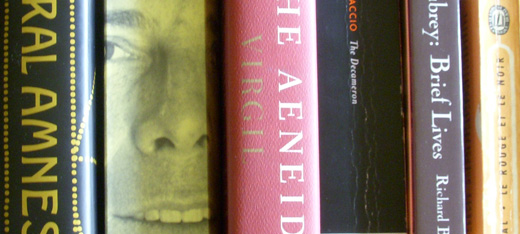Monday Morning Read
A tad late today, perhaps. I lavished the morning on bits and pieces of household paperwork. Â
¶ In the Decameron, VIII, vi, we have another Calandrino story. You remember the “simpleminded” painter, who thought he’d become invisible? He’s back, and so are his friends, who set him up to fail one of those religious oath tests that the medievals were so fond of. The whole tale has a good-ole-boy, Lone-Star quality that makes me wonder if “Tuscan” and “Texan” derive from the same root. Not.
¶ In the Aeneid, Book XI (yay!) opens with funeral rites for Pallas. Even Pallas’s steed, Blaze (Aethon), weeps.
¶ In Aubrey, the life of the celebrated anatomist, William Harvey.
I have heard him say, that after his book of the Circulation of the Blood came out, that he fell mightily in his practice, and that it was believed by the vulgar that he was crack-brained; and all the physicians were against his opinion, and envied him; many wrote against him as Dr Primige, Paracisanus etc (see Sir George Ent’s book). With much ado at last, in about twenty or thirty years’ time, it was received in all the universities in the world; and, as Mr Hobbes says … he is the only man, perhaps, that ever lived to see his own doctrine established in his life time.
On the fun front, here are two consecutive paragraphs:
He would say tghat we Europeans knew not how to order or govern our women, and that the Turks were the only people who used them wisely.
He was far from bigotry.
Put that in your Islamofascist pipe and smoke it.
¶ In Merrill, three “P” birds (parrot, pelican, and peacock), and a Primer. What seems to me to be a characteristic stanza:
A beatitude of trees which shall inherit
        Whoever’s poor in spirit
Receives the peacock in their cumbersome shade.
Some who have perfect beauty shall not grieve,
As I, for diminution: they know merit
        In body, word and deed,
     Lone angels round each human grave.
¶ In Le rouge et le noir, Julien almost weakens and requites Mathilde’s self-abasing display of affection. In the depths of her depravity, she persuades her mother to accept a perch in an fashionable box at the Bouffes , from which she stares down at Julien, her eyes filled with tears; as, tipped off to her presence by his patroness, he stares back, “en s’appuyant assez impoliment sur le devant de la loge.”
¶ How would I ever find out about Robert Brasillach if Clive James didn’t mention him so often. Brasillach didn’t just accommodate the Nazis in France, he embraced them, publishing the names of Jews in his “crapulous” newspaper, Je Suis Partout. Writing about him, James is unhappy that he was sentenced to be shot by a firing squad in 1945. Unhappy, that is, that a man who did no more than speak his mind, however vile the contenu, paid for it with his life. Better, James believes, to have locked him up for life in a cell with Céline, who of course got off with eighteen months in a Danish prison.

